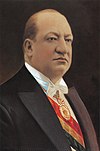Cabinet of José Luis Tejada Sorzano
Liberal Party
Socialist Republican Party
Nationalist Party
Genuine Republican Party
Politics of Bolivia |
|---|
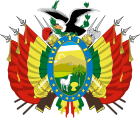 |
| Constitution |
| Executive
|
| Legislative
|
| Judiciary
|
| Elections
|
|
 Bolivia portal Bolivia portal |
|
The Cabinet of José Luis Tejada Sorzano was composed of three cabinets which constituted the 94th–96th national cabinets of the Republic of Bolivia. It was led by President José Luis Tejada Sorzano, a Liberal, and was in office from 29 November 1934 to 17 May 1936.[1]
The cabinet was formed after the armed forces ousted President Daniel Salamanca in a coup d'état and allowed his vice president, José Luis Tejada Sorzano, to assume office. It was dissolved when Tejada Sorzano was himself deposed in another coup d'état. It was the last cabinet presided over by a Liberal president.
Cabinet Ministers
 Cabinet of Bolivia Presidency of José Luis Tejada Sorzano, 1934–1936 | ||||||||
|---|---|---|---|---|---|---|---|---|
| Office | Minister | Party | Prof. | Term | Days | N.C | P.C | |
| President | José Luis Tejada Sorzano | PL | Law. | 28 November 1934 – 1 December 1934 | 3 | – | – | |
| 1 December 1934 – 17 May 1936 | 533 | |||||||
| Vice President | Office vacant throughout presidency | |||||||
| Minister of Foreign Affairs and Worship (Chancellor) | David Alvéstegui Laredo | Ind. | Law. | 22 March 1934 – 5 April 1935 | 379 | 92[a] | 5[b] | |
| 93 | 1 | |||||||
| Office vacant 5 April 1935 – 12 April 1935 | 7 | 94 | 1 | |||||
| Tomás Manuel Elío[2] | PL | Law. | 12 April 1935 – 5 March 1936 | 328 | 95 | 2 | ||
| 96 | 3 | |||||||
| Luis Fernando Guachalla[3] | PL | Law. | 5 March 1936 – 17 May 1936 | 73 | ||||
| Minister of Government and Justice | Tomás Manuel Elío | PL | Law. | 29 November 1934 – 12 April 1935 | 134 | 94 | 1 | |
| José Aguirre Espada | – | – | 12 April 1935 – 6 September 1935 | 147 | 95 | 2 | ||
| Alfredo Peñaranda | Mil. | Mil. | 6 September 1935 – 1 October 1935 | 25 | 96 | 3 | ||
| José Aguirre Espada | – | – | 1 October 1935 – 2 May 1936 | 214 | ||||
| Gabriel Palenque | – | – | 2 May 1936 – 17 May 1936 | 15 | ||||
| Minister of National Defense | Bautista Saavedra | PRS | Law. | 29 November 1934 – 14 December 1934 | 15 | 94 | 1 | |
| Gabriel Gosálvez | PRS | Eco. | 14 December 1934 – 5 August 1935 | 234 | ||||
| 95 | 2 | |||||||
| Luis Añez Rodríguez | Mil. | Mil. | 5 August 1935 – 17 May 1936 | 286 | ||||
| 96 | 3 | |||||||
| Minister of Development and Communications | José Aguirre Espada | – | – | 29 November 1934 – 12 April 1935 | 134 | 94 | 1 | |
| Carlos Calvo Calbimontes | – | – | 12 April 1935 – 22 May 1935 | 40 | 95 | 2 | ||
| Manuel Carrasco Jimenez[c] | PL | Law. | 22 May 1935 – 6 September 1935 | 107 | ||||
| José Aguirre Espada | – | – | 6 September 1935 – 1 October 1935 | 25 | 96 | 3 | ||
| Antenor Ichazo | Mil. | Mil. | 1 October 1935 – 17 May 1936 | 229 | ||||
| Minister of Finance and Industry | Carlos Víctor Aramayo[d] | PRG | Bus. | 29 November 1934 – 12 April 1935 | 134 | 94 | 1 | |
| Office vacant 12 April 1935 – 22 May 1935 | 40 | 95 | 2 | |||||
| Federico Gutiérrez Granier | PL | Law. | 22 May 1935 – 6 September 1935 | 107 | ||||
| Héctor Ormachea Zalles | – | Law. | 6 September 1935 – 17 May 1936 | 254 | 96 | 3 | ||
| Minister of Instruction and Agriculture | Enrique Baldivieso | PN | Law. | 29 November 1934 – 12 April 1935 | 134 | 94 | 1 | |
| Waldo Belmonte Pool | PRS | Law. | 12 April 1935 – 6 September 1935 | 147 | 95 | 2 | ||
| Alfredo Peñaranda[e] | Mil. | Mil. | 5 August 1935 – 6 September 1935 | 32 | ||||
| José Maria Gutiérrez[f] | PL | Law. | 6 September 1935 – 17 May 1936 | 254 | 96 | 3 | ||
| Minister of War and Colonization | Juan María Zalles | PL | Law. | 29 November 1934 – 12 April 1935 | 134 | 94 | 1 | |
| Enrique Baldivieso | PN | Law. | 12 April 1935 – 6 September 1935 | 147 | 95 | 2 | ||
| Bernardo Navajas Trigo | PL | Law. | 6 September 1935 – 17 May 1936 | 254 | 96 | 3 | ||
Composition

First cabinet
On 27 November 1934, President Daniel Salamanca travelled to the military headquarters in Villamontes in order to personally reorganize the high command of the armed forces. Considering this, Vice President José Luis Tejada Sorzano assumed office as acting president in Salamanca's absence on 28 November.[7] By that point, the military had already ousted Salamanca in a coup d'état the day prior. On 29 November, Salamanca's cabinet submitted its resignation and Tejada Sorzano, still acting president, formed a new one.[8] Tejada Sorzano formally assumed office as president on 1 December when a military commission arrived to deliver Salamanca's official resignation.[9]
The only holdover from the previous administration was Foreign Minister David Alvéstegui Laredo who had been serving since 22 March. When Alvéstegui suddenly resigned on 5 April 1935, the position remained vacant though Carlos Víctor Aramayo, a prominent tin magnate and Minister of Finance, did hold the office as acting minister for a few days. Former President Bautista Saavedra was briefly Minister of National Defense for 14 days after which he was replaced by Gabriel Gosálvez.
Second and third cabinets
Tejada Sorzano's second cabinet was formed on 12 April 1935.[10] The vacancy in the Foreign Ministry was filled by Minister of Government and Justice Tomás Manuel Elío. That ministry was in turn filled by José Aguirre Espada.[11]
Tejada Sorzano's third cabinet was formed on 6 September 1935. It was under this government that Tejada Sorzano was overthrown in a coup d'état in May 1936. Many ministers who served in his administration would support his ouster and join the government of his successor, David Toro. These included: Enrique Baldivieso, Gabriel Gosálvez, Antenor Ichazo, Luis Añez Rodríguez, and Alfredo Peñaranda.
Gallery
-
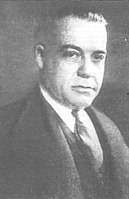 David Alvéstegui Laredo – Minister of Foreign Affairs
David Alvéstegui Laredo – Minister of Foreign Affairs -
 Tomás Manuel Elío – Minister of Foreign Affairs and Minister of Government
Tomás Manuel Elío – Minister of Foreign Affairs and Minister of Government -
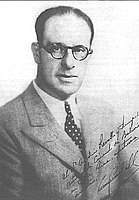 Luis Fernando Guachalla – Minister of Foreign Affairs
Luis Fernando Guachalla – Minister of Foreign Affairs -
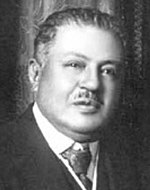 Bautista Saavedra – Minister of National Defense
Bautista Saavedra – Minister of National Defense -
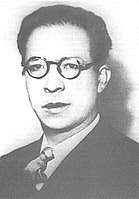 Gabriel Gosálvez – Minister of National Defense
Gabriel Gosálvez – Minister of National Defense -
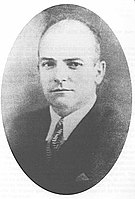 Luis Añez Rodríguez – Minister of National Defense
Luis Añez Rodríguez – Minister of National Defense -
 Manuel Carrasco Jimenez – Minister of Development
Manuel Carrasco Jimenez – Minister of Development -
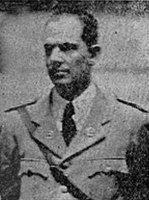 Antenor Ichazo – Minister of Development
Antenor Ichazo – Minister of Development -
 Carlos Víctor Aramayo – Minister of Finance
Carlos Víctor Aramayo – Minister of Finance -
 Héctor Ormachea Zalles – Minister of Finance
Héctor Ormachea Zalles – Minister of Finance -
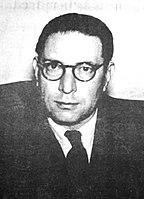 Enrique Baldivieso – Minister of Instruction and Minister of War
Enrique Baldivieso – Minister of Instruction and Minister of War -
 Waldo Belmonte Pool – Minister of Instruction
Waldo Belmonte Pool – Minister of Instruction -
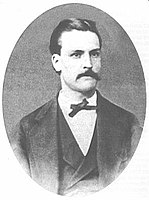 José Maria Gutiérrez Lea Plaza – Minister of Instruction
José Maria Gutiérrez Lea Plaza – Minister of Instruction -
 Juan María Zalles – Minister of War
Juan María Zalles – Minister of War -
 Bernardo Navajas Trigo – Minister of War
Bernardo Navajas Trigo – Minister of War
Notes
- ^ Originally a member of the 92nd national cabinet of Bolivia.
- ^ Originally a member of the 5th Cabinet of Daniel Salamanca.
- ^ Acting Foreign Minister: 20 May – 6 September 1935.[4]
- ^ Acting Foreign Minister: 5–12 April 1935.[5]
- ^ Acting/Interim?
- ^ Acting Foreign Minister: 6 September 1935 – 18 January 1936.[6]
References
- ^ Gisbert 2003, pp. 340–343
- ^ "Tomás Manuel Elío". archive.vn. 19 February 2013. Archived from the original on 19 February 2013. Retrieved 17 February 2021.
- ^ "Luis Fernando Guachalla". archive.vn. 19 February 2013. Archived from the original on 19 February 2013. Retrieved 17 February 2021.
- ^ "Manuel Carrasco Jimenez". archive.vn. 19 February 2013. Archived from the original on 19 February 2013. Retrieved 17 February 2021.
- ^ "Carlos Víctor Aramayo". 28 January 2016. Archived from the original on 28 January 2016. Retrieved 16 February 2021.
- ^ "José Maria Gutiérrez". 7 April 2014. Archived from the original on 7 April 2014. Retrieved 17 February 2021.
- ^ "DECRETO SUPREMO No 28-11-1934 del 28 de Noviembre de 1934 » Derechoteca". www.derechoteca.com. Retrieved 17 May 2021.
- ^ "DECRETO SUPREMO del 29 de Noviembre de 1934 – 2 » Derechoteca". www.derechoteca.com. Retrieved 17 May 2021.
- ^ "DECRETO SUPREMO del 01 de Diciembre de 1934 – 2 » Derechoteca". www.derechoteca.com. Retrieved 17 May 2021.
- ^ "DECRETO SUPREMO del 12 de Abril de 1935 – 1 » Derechoteca". www.derechoteca.com. Retrieved 17 May 2021.
- ^ "DECRETO SUPREMO del 22 de Mayo de 1935 – 1 » Derechoteca.com". derechoteca.com. Retrieved 17 February 2021.
Bibliography
- Gisbert, Carlos D. Mesa (2003). Presidentes de Bolivia: entre urnas y fusiles : el poder ejecutivo, los ministros de estado (in Spanish). Editorial Gisbert. pp. 340–343.


















